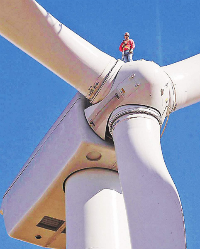From Guest-Blogger Joshua Okomo: A Nation Going Green Is Growing Jobs
Renewable energy investment is not only for energy deployment and world ecology management, it is also for jobs. Nations can choose ruthless economic growth when economic growth is never accompanied by democracy, empowerment and human rights or fruitless economic growth when growth is accompanied by reducing job opportunities.
Throughout the world availability of good jobs is the cheapest way to create human development, enlarging peoples choices to live a long , decent and productive life. Renewable energy technologies create more jobs per megawatt of power generated, and per dollar invested in construction, manufacturing and installation as compared to coal or natural gas.
Wind energy creates 27% more jobs than coal and 66% more jobs than natural gas plant per kilowatt hour generated. In renewable energy development, construction employment rate is 2.57 per MW for wind and 7.14 per MW for solar photovoltaic, operating employment rate range from 0.12 jobs per MW to 2.28 jobs per MW being for landfill gas digesters.
If a company invests in 100 MW wind farm, 257 jobs will be created in construction and 180 jobs in operation. Investment in 100 MW solar utility plant will create 714 new jobs in construction and more jobs in energy production.
A study in California USA found that clean energy can produce 652,000 jobs in 10 years and 1.4 million jobs will have been created by 2025, reducing California unemployment rate by 14 %. The United States of America is pursuing aggressive development of the renewable energy and energy efficiency industries, this if done could generate up to US $ 4.5 trillion in revenue and creating 40 million new jobs by the year 2030. Clean energy development not only helps to mitigate the twin challenge of climate change and fossil fuels dependency, it holds great promise to addressing the pressing need for quality jobs with pathway to sustainable careers , the green economy. All nations are making jobs in renewable energy investment, for nations that will achieve renewable energy targets in 2020 they shall have made jobs for their citizens.
Joshua Okomo is Proprietor of Environment Stores & Logistics.


To the extent that renewable sources of energy create more jobs than other sources of energy, the price of the energy will be higher.
The Industrial Revolution was about getting the job done with fewer people. That reduced prices thereby permitting more people to afford the goods and services.
@Frank Eggers: You forget that unemployment is at extreme levels not seen in this generation. Every job generated is at least as valuable as each megawatt. In addition, every dollar of foreign oil displaced with domestic energy is doubly valuable.
@ Will Deliver,
Actually, I have forgotten nothing.
Higher priced energy would actually depress the economy. It would increase the price of goods and services thereby making them less affordable. And, if goods and services are less affordable, fewer people will buy them thereby leading to lower employment. The argument that renewable sources would employ more people is therefore actually a good argument against them. Those of us who have studied economics (in which I have the equivalent of a minor) can clearly understand that.
I suggest that you do some research to determine how much concrete and steel is required for wind and solar power systems compared with nuclear power. There have even been proposals to build concrete production facilities to provide for the huge amounts of concrete required. I shall not provide the links; doing so would be less effective than for people to do their own research.
Wind and solar power would have no direct effect on the amount of oil imported. Wind and solar power would be used to produce electricity; we use very little oil to produce electricity in the U.S,, although in some small island countries, Diesel fuel is the primary source of energy to produce electricity.
If we can produce energy cheaply enough, we can use part of it to produce artificial fuels to replace oil. One of the artificial fuels could be NH3, although that is only one possibility; dimethyl ether has also been proposed. Battery electric vehicles could also become common.
In much of India, the power is so unreliable that factories have Diesel generators which they start when the power fails. If power becomes unreliable here in the U.S. because it depends on intermittent sources, it will have to be backed up by reliable sources using fossil fuels. Surely that is not what we want.